

| |
|||
Black Performance Theory 2009: |
|||
Confirmed Participants: |
|||
 |
Jafari Sinclaire Allen ( Ph.D. Columbia University, 2003), is Assistant Professor of Anthropology and African American Studies at Yale University.
Professor Allen works at the intersections of [queer] sexuality, gender and blackness -- in Cuba, the US, and transnationally. A recipient of fellowships from the National Science Foundation, Social Science Research Council Sexuality Research Program, and Rockefeller Foundation [Diasporic Racisms Project]; he teaches courses on the cultural politics of race, sexuality and gender in Black diasporas; Black feminist and queer theory; critical cultural studies; ethnographic methodology and writing; subjectivity, consciousness and resistance; Cuba and the Caribbean.
Dr. Allen’s forthcoming critical ethnography, ¡Venceremos?: Sexuality, Gender and Black Self-Making in Cuba [Perverse Modernities series of Duke University Press, Fall 2009], marshals a combination of historical, literary, and cultural analysis-- most centrally, ethnographic rendering of the everyday experiences and reflections of Black Cubansto show how Black men and women strategically deploy, re-interpret, transgress and potentially transform racialized and sexualized interpellations of their identities, through “erotic self-making.” ¡Venceremos? argues that mutually constituting scenes in Havana and Santiago de Cuba-- like semi-private, extra-legal parties of men who have sex with men; HIV education activism; lesbian performance and incipient organizing of women who have sex with women; hip-hop and la monia (US R&B/soul music) parties and concerts; sex labor; cigar “hustling”; and informal Black consciousness raising networks-- represent a gravid space for becoming new revolutionary men and women, with new racial, gender and sexual subjectivities.
His current research project, Once Removed: Queer Alter-natives and the redemption of a transnational Black counter-public, traces the work of Black transgender, lesbian, bisexual gay, and same gender loving artists, activists, organic intellectuals, and everyday people, that, continuing in the insurgent Black intellectual tradition, produce trenchant critique of violence, silence, invisibility and forgetting “at home” [in a number of places throughout the Americas] and create forms of politics and expressive practices which resist oppressive structures of the state and global capital. |
||
 |
Marlon M. Bailey (Ph.D., M.A. University of California, Berkeley, M.F.A. West Virginia University, B.A. Olivet College) is Assistant Professor in Gender Studies and African American and African Diaspora Studies at Indiana University (Ph.D., University of California, Berkeley, 2005). He teaches courses in Sex and Gender in Cross Cultural Perspective; Sexual Politics; and The Cultural Politics of HIV/AIDS. His research interests include: African Diaspora studies, queer diasporas, race, gender, and sexuality, queer theory, Black queer studies, theatre/performance studies, ethnography, and HIV/AIDS (cultural politics, research, and prevention of HIV/AIDS in Black communities). Dr. Bailey earned his PhD in African Diaspora Studies with a designated emphasis in Women, Gender, and Sexuality, in the Department of African American Studies at the University of California-Berkeley. His dissertation, "The Labor of Diaspora: Ballroom Culture and the Making of a Black Queer Community," is an ethnographic study of Ballroom culture in Detroit MI, a Black and Latina/o queer culture in the U.S. Dr. Bailey has published on Black queer performance as well as the same-sex marriage debates. Currently, he is working on a manuscript that expands his ethnographic study of Ballroom culture. Dr. Bailey is also an accomplished professional actor, director, and performance artist. His most recent performance was in "The Hard Evidence of Existence," at the Thick House in San Francisco, California. During the 2006-07 academic year, Dr. Bailey held a prestigious post-doctoral fellowship at UC Berkeley. He began teaching at Indiana University, Bloomington in the fall of 2007.In addition, my book manuscript in progress is Butch/Queens up in Pumps: Gender, Performance, and Ballroom Culture in Detroit is under advanced contract with the University of Michigan Press. | ||
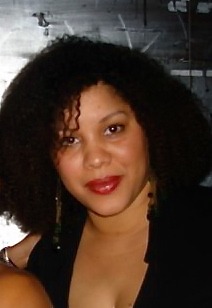 |
Stephanie
Batiste (PhD, George Washington University;
AB Princeton
University)is interested in relationships between representation, performance, identity, race, and power. She specializes in African American and 20th century American literature and culture. Her research and teaching focus on the ways in which cultural texts (literature, theater, performance, film, art, bodies) as imaginative systems are themselves performative of identity, cultural values, and human interactions. Her book project, Darkening Mirrors: Imperial Representation, Otherness, and Subjectivity in African American Performance during the Depression Era examines the complicated ways African Americans participated in American ideologies of cultural imperialism. She also performs in and directs dramatic works. She has developed a performance piece called, Stacks of Obits, that addresses themes of family, love, loss, and home through a consideration of gun violence and street murder in Los Angeles. She has performed in community-theater and participated in special programs at professional theaters in Pittsburgh. |
||
 |
Annemarie Bean is an independent scholar living and raising her children Elsa and Tobias in Vermont. She has taught in the theatre, American Studies and African American Studies Programs at Williams College and Wesleyan University. Along with Sandra L. Burton, Bean organized Stalwart Originality, an annual conference at Williams that celebrated African American performance. Bean’s specialization areas are in performance studies and intercultural performance, with a particular concentration on performances of race and gender in American theatre and performance. She is the co-editor, along with James V. Hatch and Brooks McNamara, of Inside the Minstrel Mask: Readings in Nineteenth-Century Blackface Minstrelsy, published by Wesleyan University Press in 1996 and winner of the 1997 Errol Hill Award, given for outstanding scholarship in African American theatre studies by the American Society for Theatre Research. Professor Bean is also the editor of A Sourcebook on African-American Performance: Plays, People, Movements, published by Routledge in 1999. She is currently fine-tuning her manuscript, Transperformance: Almost Crossing America. Transperformance centers on American cross-dressed and cross-raced performances on stage and television in the 19th and 20th centuries. | ||
 |
Melissa Blanco (BA Brown University, MA USC) received her PhD in Dance History & Theory from UC Riverside in December 2006. Her dissertation “A Case of Hip(g)nosis: An Epistemology of the Mulata Body and her Revolutionary Hips” (chaired by Anna Beatrice Scott) analyzes the tragic figure of the mulata and her crucial role in various forms of cultural production in Cuba, and throughout the Caribbean and Circum-Atlantic. She contests the literary trope of the “tragic mulata” and argues that there can be no such thing as tragedy when an active body uses her hips to claim territory, citizenship, and socio-cultural agency. She is currently preparing a chapter for Alicia Arrizón (UCR) and Deborah R. Vargas’ (UCI) forthcoming edited volume entitled Sensualidades:Latina/o Sensualities in Sounds and Movements where she does a critical performance analysis of the Mexican cabaretera film Mulata (1954). Trained in Afro-Cuban dance, she has performed in New York, Los Angeles, and Havana. Her scholarship endeavors to demonstrate how dance and theories of the body provide new methodologies for inquiries into such perennial issues of identity as nation, gender, and racialization. She is also working on a cabaret spectacle entitled “Mulata Madness” based on sections from her dissertation. She was an MLK Post-Doctoral Fellow at MIT in 2007-2008. She is now Assistant Professor at the University of Surrey. | ||
 |
Sheriden Booker is a Ph.D. candidate at Yale University in the departments of Anthropology and African American Studies and is a recipient of the Ford Foundation Predoctoral Diversity Fellowship. Her research interests center on music and dance performance in the Circum-Atlantic, and their relationship to issues of race, ethnicity, (post)coloniality, and religion. For her dissertation entitled “La Reconquista de la Habana”: The Rise of Spanish Flamenco as the Gendered Performance of New Race/Class Differences in Cuba, 1988-2008, she has been particularly interested in documenting how geopolitical changes, access to new media technologies, the introduction of capitalist logics, and the commercialization of local cultural institutions foreground the circulation of artistic forms, and inflect body politics, processes of cultural creolization, and the social meanings emergent in and through performance. Sheriden’s academic vita reflects her lifelong interests in the arts and has been informed by a breadth of professional work experience with both for-profit and non-profit organizations, including Walt Disney Studios and Virgin Records in her native Los Angeles, California, and The Brooklyn Academy of Music and Dance Theatre of Harlem in New York City. |
||
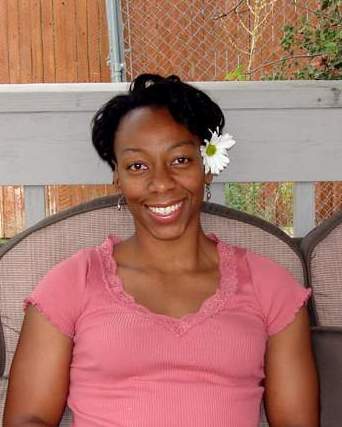 |
Rashida
Braggs (Ph.D Northwestern University, M.S. Boston University,
B.A. Yale University) is a post-doctoral teaching fellow in the
Introduction to Humanities program at Stanford University. In her dissertation, “American” Jazz: Traversing Race and Nation in Postwar France, Rashida problematized the idea that jazz is uniquely American by investigating collaborations of African-American artists and their French counterparts in postwar France. Braggs has published in Nottingham French Studies and her current projects include an article on jazz saxophonist Sidney Bechet and a creative non-fiction piece on vocalist Inez Cavanaugh. |
||
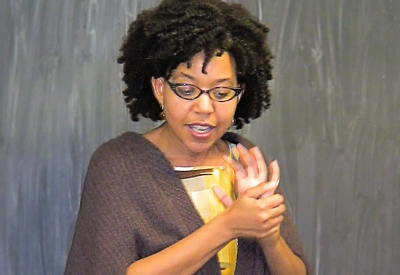 |
Daphne Brooks is an associate professor of English and African-American Studies at Princeton University where she teaches courses on African-American literature and culture, performance studies, critical gender studies, and popular music culture. She is the author of two books: Bodies in Dissent: Spectacular Performances of Race and Freedom, 1850-1910 (Duke UP, 2006), winner of the 2007 Errol Hill Award for outstanding scholarship in African American Theater Studies, and Jeff Buckley'sGrace (New York: Continuum, 2005). She is also the editor of The Great Escapes: The Narratives of William Wells Brown, Henry Box Brown, and William Craft, (New York: Barnes & Noble Classics, 2007) and the performing arts volume of The Black Experience in the Western Hemisphere, series eds. Howard Dodson and Colin Palmer (New York: Pro-Quest Information & Learning, 2006). Brooks is a contributing writer for The Nation where she has published articles on Beyonce and Amy Winehouse. She is currently at work on a new book manuscript entitled Subterranean Blues: Black Feminist Musical Subcultures--from Minstrelsy to the Post-Hip Hop Era. Brooks is the past recipient of fellowships from the Ford Foundation, the Mellon Foundation, the Woodrow Wilson Career Enhancement Fellowship Program, and the University of California Humanities Research Institute. She has also held residence at U.C. Berkeley as a President's Postdoctoral Fellow and at Harvard University as a W.E.B. DuBois Research Institute Fellow. | ||
 |
Mark Broomfield is a doctoral candidate in Dance History and Theory at the University of California, Riverside, and is currently working on his dissertation titled Passing for Almost Straight: Critiquing the Performance of Masculinity of the Black Male Dancing Body. His dissertation explores the performance and representation of masculinity in American contemporary dance and culture, while confronting homophobia and the complex intersections of race, gender, and sexuality in dance performance. He has taught in the Theatre and Dance Department of Phillips Academy Andover and as an Assistant Professor at Santa Fe Community College, Gainesville, Florida, where he was Resident Choreographer. As a dancer, he has performed in the companies of Cleo Parker Robinson Dance, Snappy Dance Theater, and Gerri Houlihan and Dancers. He holds a B.A. in Communication from SUNY Geneseo and an M.F.A. in Dance from the University of Michigan, Ann Arbor. Broomfield is also the Artistic Director of the Numen Project. Recent works of his include Dance of the Male Goddess and Pink Pumps, a solo multi-media dance theater performance. He is the recipient of the 2006 Ford Foundation Predoctoral Fellowship. This fall, Broomfield will join the Department of Theatre and Dance at the University of Richmond. | ||
 |
Jayna Brown researches performance and culture in the U.S. and elsewhere in the Diaspora, with a focus on vernacular expressive forms and the body. Her book, Babylon Girls: Black Women Performers and the Modern Body, is published by Duke University Press. She has also published on African American race film and the black filmmaker Oscar Micheaux. She earned her Ph.D. at Yale University's African American Studies Department, and she has been awarded dissertation and postdoctoral Ford Foundation Fellowships as well as a Rockefeller Award for the Study of Black Culture at the Stanford Humanities Center. Her two current projects are a series of essays on race, technology and utopias in speculative fiction and global pop music, and another project on black women and post punk music in Britain. Her classes at University of California at Riverside include: African American Women Intellectuals and Artists, Race and Performance and African American Literature. | ||
 |
La Marr Jurelle Bruce received his B.A. in African-American Studies and English, with honors, from Columbia University in 2003. He is now a Ph.D candidate in African-American Studies and American Studies at Yale University who investigates “madness” in late-modern and postmodern Afrodiasporic cultural production. He is interested in how “madness” has been ascribed to Afrodiasporic subjects by colonial and neocolonial imaginations-and in how Afrodiasporic subjects have produced, claimed, and innovated "madness" for insurgent imaginations and radical creativities. La Marr is also a poet, a novelist-in-waiting, a Beinecke Library fellow, co-editor of Maroon: The Yale Journal of African American Studies, and an occasional madman in his own right. His hobbies include time travel, transcendental sex, nature documentaries, handwashing, and self-parody. Click here for more. |
||
 |
Soyica Diggs Colbert's interests are black theatre, literature, performance, and culture, and women's and gender studies. Currently Colbert is working on two book projects. The first, Black Theatricality: Repetition and Reproduction, argues that African American drama presents strategies to interpret historical evidence embedded in black performance (e.g. cakewalking, singing the blues, and delivering a sermon). The second, Black Movements: Performance, Politics, and Migration, examines multiple meanings of movement (i.e. migration, immigration, community activism, and embodied performance) in black literature and cultural productions in an effort to bring studies of black diaspora into conversation with theorizations of black performance. She has published articles in New England Theatre Journal and Theatre Topics. Her work also appears in collections entitled, Contemporary African American Women Playwrights and Sonic Interventions. | ||
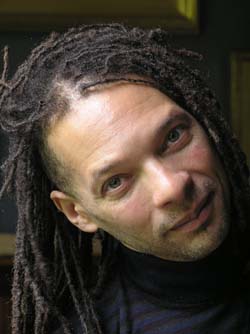 |
Thomas F. DeFrantz earned degrees from Yale, City University of New York, and NYU, and has taught at NYU, Stanford, and MIT where he is Associate Professor of Music and Theater Arts. His research centers on African American performance. As a performer: Morton Gould Tap Concerto with the Boston Pops conducted by Keith Lockhart; Duke Ellington Tap Concerto with the Aardvark Jazz Orchestra led by Mark Harvey. As a director and writer: affiliations with the Drama League of New York, the Theater Offensive of Boston, and the performance research group Slippage: Performance Interventions in Culture and Technology, in residence at MIT. Recent original plays: Queer Theory! A Musical Travesty, an National Performance Network project commissioned by the Flynn Center for the Arts and the Theater Offensive; The Downright Sexy Adventures of Drew Durango, written with composer Michael Wartofsky for New York cabaret star Darius de Haas; Ennobling Nonna, produced at MIT; and Monk’s Mood: A Performance Meditation on the Life and Music of Thelonious Monk. Publications include Dancing Many Drums: Excavations in African American Dance (University of Wisconsin Press) and Dancing Revelations: Alvin Ailey's Embodiment of African American Culture (Oxford University Press). Served on the boards for the Society of Dance History Scholars and as Book Editor for the Dance Critics Association. For many years he organized the dance history program at the Alvin Ailey School in New York. Core faculty, American Dance Festival/Hollins University MFA Program. Current Research: Black Beauty: Concert Dance in the Africanist Grain. Current Performance Project: CANE: A Responsive Environment Dancework, based on Jean Toomer's novel. | ||
 |
Nadine George Graves (PhD, Northwestern). PhD Faculty UCSD. George-Grave's work is situated at the intersection of African American studies, feminist studies, theatre history, and dance history. She is the author of The Royalty of Negro Vaudeville: The Whitman Sisters and the Negotiation of Race, Gender, and Class in African American Theater, 1900-1940 (New York: St. Martinís, 2000) and is already well into her second book, Urban Bush Women and Postmodern Black Performance. In addition to her impressive scholarship, Nadine has written four plays and a screenplay. She also has extensive experience and training as an actor, director, dancer, and choreographer. | ||
 |
Lyndon K. Gill holds a B.A. with honors and distinction in African and African American Studies from Stanford University (2003) and an A.M. in Social Anthropology from Harvard University (2005). His scholarly interests include racial formation and diaspora, the socio-scientific construction of sex and gender, sexuality as a category of cultural analysis, queer cultural production, ritual and corporality within performance genres, desire and the erotic, and post-coloniality. His research currently focuses on the Caribbean and Latin American region in general and Trinidad and Tobago, W.I. in particular. He has been known to write and perform poetry at whim. |
||
 |
Eric Miles Glover is a rising PhD student in English at Princeton University. His research and teaching interests include African-American literature and culture, African-American theater and performance, gender and sexuality studies, and critical race theory. He studies black gay expressive culture. | ||
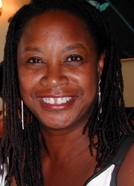 |
Anita Gonzalez (Ph.D. 1997 University of Wisconsin-Madison) is an Associate Professor and Associate Chair in Theater Arts at the State University of New York – New Paltz where she teaches directing, movement, and theater history courses. She is the author of the book Jarocho’s Soul: Cultural Identity and Afro-Mexican Dance, and the forthcoming Afro-Mexico: Dancing Between Myth and Reality Her articles about performance appear in Radical History Review, Modern Drama, Dance Research Journal, Journal of Dramatic Theory and Criticism, and Women and Performance and her essays appear in Community Performance Reader and Latinas On Stage. Anita has served on the Board, and the Programming Committee of the Society of Dance History Scholars. She is an associate member of the Society of Stage Directors and Choreographers. Gonzalez has been an artist-in-residence at Rockefeller’s Bellagio Center, and has won multiple awards for theater production and research including three Fulbright Senior Scholar Awards. | ||
 |
Tsitsi Jaji (Ph.D., M.A., Cornell University, B.Music, B.A., Oberlin
College) is an Assistant Professor in English and Africana Studies at
University of Pennsylvania. Her research interests are centered on
what might be called diaspora in reverse--the influence of black
diasporic cultures on continental Africa. Currently she is working on
a book entitled "Africa in Stereo: Comparative Black Acoustic
Imaginaries" which traces the work jazz, soul and reggae music do as
signs of pan-African solidarity in African poetry and film. She has
published articles or book chapters on Maryse Condé, Nafissatou Diallo, Edouard Glissant, Keorapetse Kgositsile, Toni Morrison and Derek Walcott. |
||
 |
E. Patrick Johnson is Professor, Chair, and Director of Graduate Studies in the Department of Performance Studies and Professor in the Department of African American Studies at Northwestern University. He is the author of Appropriating Blackness: Performance and the Politics of Authenticity (Duke, 2003), Sweet Tea: Black Gay Men of the South—An Oral History (UNC, 2008), and co-author (with Mae G. Henderson) of Black Queer Studies: A Critical Anthology (Duke, 2005). He is touring a one-man show based on the narratives in Sweet Tea. | ||
 |
Christina Knight is a third year doctoral candidate in the African and African American Studies Department at Harvard with a secondary field in History of Art and Architecture. She received her BA with honors from Stanford University in Interdisciplinary Studies in the Humanities in 2005. Her current research focuses on representations of the Middle Passage in contemporary American visual art and performance. | ||
 |
Sarah Lewis is a Critic at Yale University, School of Art and is also a Doctoral Candidate in the Yale University History of Art Department. She received her B.A. from Harvard University and an M.Phil from Oxford University. She has published widely, writing on contemporary African American artists including Mark Bradford, Lyle Ashton Harris, Mickalene Thomas, and Kehinde Wiley in publications for Powerhouse, The Smithsonian Institute National Museum of African American History and Culture, The Studio Museum in Harlem, The Guggenheim and Art in America. Prior to coming to Yale, she held curatorial positions at the Tate Modern and The Museum of Modern Art. She has been selected as co-curator for the 2010 SITE Santa Fe Biennial and will curate an exhibition Whitfield Lovell’s work at the Wadsworth Athenaeum Museum of Art the following year. She also serves on President Obama’s Arts Policy Committee. |
||
 |
|
||
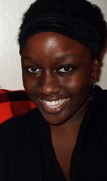 |
Aida Mbowa is a second-year graduate student in the Department of Drama at Stanford University. A Ugandan national born and raised in Nairobi, Kenya, Aida received her BA in Performance and Identity Studies from Mount Holyoke College. At Stanford, Aida directed Wole Soyinka’s Death and the King’s Horseman, and assisted Harry Elam on Theatreworks’ production of August Wilson’s Radio Golf. Her research interests include East African and African American political performances during the decolonization and Black Arts Movements. Other intellectual curiosities include postcolonial theory, performance theory and black sound. | ||
 |
Paige McGinley is Assistant Professor of Theater Studies, American Studies, and African American Studies at Yale University, where she teaches courses in African American theater history, nationalism and performance, and performance historiography. She received her Ph.D. in Theater and Performance Studies from Brown University, and a B.A. from Trinity College (CT). Her essays have been published in PAJ: A Journal of Performance and Art, Performance Research, and TDR. She is currently at work on a book manuscript examining blues performance, migration, and theatricality. | ||
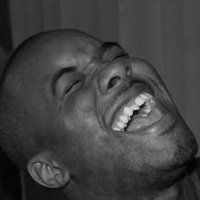 |
|
||
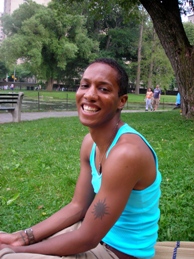 |
Uri McMillan just completed a Ph.D. in African-American Studies and American Studies at Yale University. He will be the Andrew Mellon Postdoctoral Fellow in Ethnic and Gender Studies at Lewis and Clark College in Portland, Oregon, beginning fall of 2009. His dissertation “Subversive Objecthood: Black Female Performance” examines performances of alter-egos staged by black women performers in the nineteenth and twentieth centuries across the representational realms of performance art, visual culture, video art, the abolitionist lecture stage in America and the British Isles, and literary escape narratives. His research interests include feminist performance art, contemporary black diasporic art, visual culture, feminist theory, and nineteenth and twentieth century black performance. A recipient of grants from the Ford Foundation and the Woodrow Wilson Fellowship Foundation, he has published work in e- misférica, Flow (exhibition catalogue, The Studio Museum of Harlem), and Maroon: The Yale Journal of African-American Studies. | ||
 |
Koritha Mitchell (PhD, University of Maryland-College Park) is completing a book project that analyzes black-authored lynching plays, tentatively titled Enduring Modern American “Strange Fruit”: Lynching Drama, African American Citizenship, and U.S. Culture, 1890 -1930. Mitchell's work has been funded by the David Driskell Center for the Study of the African Diaspora and the Ford Foundation, and her primary interests are African American literature of the late nineteenth and early twentieth centuries, racial violence throughout American literature and culture, and black drama and performance. She earned her PhD from the University of Maryland-College Park and is currently assistant professor of English at The Ohio State University. | ||
 |
Madison Moore is a graduate student in American Studies at Yale University. He is the recipient of both the Beinecke fellowship for graduate study and a Ford Pre-Doctoral Fellowship. Madison's research interests are modern and contemporary art, performance studies, luxury industries and nightlife cultures. His dissertation research project looks at performances of luxury in art, high-end real estate and fashion. Madison writes regularly about glamour and pop culture at Splicetoday.com | ||
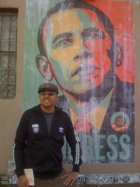 |
Tavia Nyong'o Ph.D. 2003; M.A. 2002; American Studies, Yale University B.A. 1995; College of Social Studies, Wesleyan University The research interests of Tavia Nyong'o include the intersections of race and sexuality, visual art and performance, and cultural history. He teaches courses on black performance, the history of the body, and subcultural performance. His book, The Amalgamation Waltz: Race, Performance, and the Ruses of Memory (University of Minnesota Press, 2009), investigates musical, aesthetic, and political practices that conjoined blackness and whiteness in the nineteenth and twentieth centuries. He is the web editor of Social Text. | ||
 |
Carl Paris holds an M.A. in Dance and Dance in Higher Education, NYU and a Ph.D. in Dance Studies and Cultural Theory, Temple University. Carl has taught dance and dance related courses at New York University and Long Island University. More recently, he taught courses in African American History and Race and Ethnicity in American Culture at John Jay College of Criminal Justice. As a dancer, Carl was a member of Olatunji African Dance, The Eleo Pomare Dance Company, The Martha Graham Dance Company, and The Alvin Ailey American Dance Theater. For seventeen years, he taught and choreographed in Spain and throughout Europe. In 1995, he received the nationally recognized Dance Association of Madrid Award for his work as a teacher. After returning to the U.S. to pursue his graduate work, he was a guest teacher and choreographer at CalArts, the Alvin Ailey Repertory Company, the Fiorella La Guardia High School of the Performing Arts, and the Martha Graham School. He has served on panels at conferences in dance research and his critical reviews and essays on blacks in postmodern dance, Bill T Jones, and Alvin Ailey have appeared in several dance publications. Carl is presently Martin Luther King Visiting Fellow at MIT where he teaches a class in the Traditions of American Concert Dance: Gender and Autobiography. He is working toward a book of essays that uses black theatrical (modern) dance to interrogate issues around individual representations of race, culture, gender, and sexuality. |
||
 |
Imani Perry will be joining the faculty at Princeton as a Professor in the Center for African American Studies, in the fall of 2009. Since 2002, she has been a Professor at Rutgers School of Law-Camden. Perry received her B.A. from Yale, her Ph.D. from the Program in the History of American Civilization at Harvard, and her J.D. from Harvard Law School. She is the author of Prophets of the Hood: Politics and Poetics in Hip Hop (Duke University Press, 2004) and the forthcoming Righteous Hope: The Making and Unmaking of Racial Inequality in the 21st Century United States (New York University Press). Perry is also the author of over 20 articles in the fields of Cultural Studies, African American culture and the law, and Popular Music. |
||
 |
Omi Osun Olomo/Joni L. Jones is the Director of The John L. Warfield Center for African and African American Studies and Associate Professor of Performance Studies in the Department of Theatre and Dance at the University of Texas at Austin. She is an artist/scholar who is currently engaged in performance ethnography around the Yoruba deity Osun, and is writing a collaborative ethnography on the use of a jazz aesthetic in theatre. While on a Fulbright Fellowship in Nigeria (1997-98), Dr. Jones taught at Obafemi Awolowo University and contributed Theatre for Social Change workshops for the Forum on Governance and Democracy in Ile-Ife. Her articles on performance and identity have appeared in Text and Performance Quarterly, The Drama Review, Theatre Topics, Theatre Journal, and Black Theatre News. She is the founder of The Austin Project—a collaboration of women of color artists, scholars, and activists who use art for re-imagining society. Her performance ethnography includes Searching for Osun, sista docta, and Broken Circles: A Journey Through Africa and the Self. |
||
 |
Venus
Opal Reese (Ph.D., MA Stanford University, MFA, Ohio State University,
BFA, Adelphi University)
is an award winning solo performer, playwright, director, choreographer and poet. She is a scholar/performing artist who has performed nationally and internationally for over 17 years. Her latest solo performance work, Split Ends, a piece about Black women and hair, was featured on the cover of the Palo Alto Weekly, showcased at the Black Repertory Theatre in Rhode Island and ran off-Broadway at La MaMa ETC. Split Ends was nominated for a 2007 AUDELCO Award. Dr. Reese was recently featured on ABC News and in Glamour Magazine and Diversity Inc., as an expert on race, beauty, and culture. Her performance with the Hip-Hop theatre play, Will Power’s The Seven, was featured in the American Theatre Magazine and won 3 Critic Choice Awards. Dr. Reese has presented and performed internationally at the Sorbonne, Paris, France under the auspices of the W.E.B. Dubois Institute at Harvard University, La MaMa Umbria International, Spoleto, Italy, and Universita di Padova, Padova, Italy. Nationally she has performed and directed with such establishments as Cultural Odyssey, AfroSolo, the LA Women’s Festival, and the Hip-Hop Theatre Festival, NYC. Locally, in Dallas, TX, she has performed performance poetry works with Word Space and performed excerpts of previous works with Laughing Tongues at Undermain Theatre. As a scholar, Dr. Reese’s research links Africa, the Middle Passage, Antebellum Slavery, minstrelsy and popular culture through the stories we tell. She offers and designs courses in Spoken Word, Elements of Arts and Performance, Theatre, Movement Theatre, African Dance, American Character, Acting, Performativity, Cultural Studies, Womanism/Feminism, Queer Theory, Literary Theory, and Critical Race Theory. She consults and trains in the area of race, beauty, and culture by combining her performance background with her academic training. Dr. Reese has a BFA from Adelphi University; an MFA from Ohio State University in Acting and Movement Theatre, with an emphasis on choreography and mime; an MA in drama, and a Ph.D. in Directing, Performance Theory/Literary Criticism, both from Stanford University.
|
||
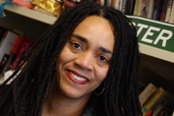 |
Francesca T. Royster is an Associate Professor of English at DePaul University, and will chair the African and Black Diaspora Studies Program at DePaul beginning in July 2009. Her areas of expertise include Shakespeare Studies, African American Culture and Performance, gender and queer theory. She received her PhD from University of California, Berkeley in 1995. Her book, Becoming Cleopatra: The Shifting Image of an Icon was published by Palgrave in 2003, and she has published essays in Women and Performance, Shakespeare Quarterly, Shakespeare Studies, Sexuality, Performance Research and other books and journals. Her current book project, Performing Eccentricity: Black Popular Music and the performance of “strange” in the post-soul moment, is under contract at University of Michigan Press, and considers the performance of outsider, “eccentric” and queer sexualities by Michael Jackson, Grace Jones, Sylvester and other post-civil rights movement icons. She has trained and volunteered as a counselor for the Chicago Rape Crisis Hotline and has served on the board for Beyondmedia Education, an organization focusing on grassroots media activism for women and youth and Women and Girls Collective Action Network. Her other interests include film and videomaking, photography, activism through performance, and jazz bass. | ||
 |
Frank Leon Roberts is a Ph.D. candidate in the Department of Performance Studies at NYU. He received his B.A. in English and African American Studies (Comparative American Studies) from NYU’s Gallatin School. Since then he has taught at the college level as an Adjunct Lecturer in the Department of Social and Cultural Analysis at NYU, in the Program in Gender and Sexuality Studies. His fields of interest include contemporary African American art; experimental film and video; critical race theory, and queer theory and criticism. He also specializes on issues related to AIDS and queer politics. He is a recipient of the 2009-2010 Ford Foundation Dissertation Fellowship Award. |
||
 |
C. Riley Snorton is a doctoral candidate at the Annenberg School for Communication, University of Pennsylvania and a W.E.B Dubois Institute Fellow at Harvard (Fall 2009). He received his BA in Women and Gender Studies from Columbia University in 2003. His academic interests include Media Anthropology, Africana Studies, Gender and Queer Theory, Cultural Studies, Performance Studies, and Media Activism. He is the director of a short documentary, entitled Men at Work: Transitioning on the Job, and has articles published and forthcoming in the International Journal of Communication, Hypatia: a journal of feminist philosophy, and Souls: a critical journal of Black politics, culture, and society. Before beginning his Ph.D. program, he worked as a media relations manager for the Gay & Lesbian Alliance against Defamation and the Gay, Lesbian & Straight Education Network. His dissertation, Trapped in the Epistemological Closet: Black Sexuality and the Popular Imagination, examines the concept of the "down low" in popular culture. |
||
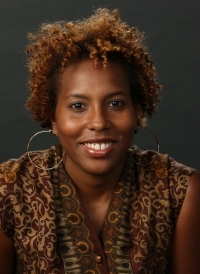 |
Salamishah Tillet is an Assistant Professor of English and Africana Studies at the University of Pennsylvania. She received her Ph.D. in the History of American Civilization from Harvard University and her Masters in the Art of Teaching from Brown University. She also graduated Phi Beta Kappa from the University of Pennsylvania where she received her B.A. in English and Afro-American Studies. Salamishah is the co-founder of the sexual violence prevention and expressive arts organization, A Long Walk Home, Inc. and a contributor to the online magazine, The Root.Com. Her forthcoming book, Peculiar Memories: Slavery and the Post-Civil Rights Imagination examines how contemporary black artists and intellectuals reimagine slavery as a trope for post-Civil Rights citizenship and political desire. |
||
 |
Isaiah
M. Wooden is a first year doctoral
student and director-dramaturg in the Department of Drama at Stanford
University. He received his bachelor's degree in Government and Theater
from Georgetown University (2004), where he was an adjunct faculty
member and Artistic Director of the Black Theatre Ensemble between
2005 and 2008. His research interests include cross-cultural performance,
popular culture, and the politics and performance of identity in contemporary
African American drama. He has worked professionally as a director,
dramaturg, scenic designer, and performer. |
||
 |
Hershini Bhana Young s Associate Professor at Suny at Buffalo where she teaches classes on gender, sexuality, race and performance. Her first book, Haunting Capital: Memory, Text and the Black Diasporic Body (UPNE) examines the injured body in literature and art of the African diaspora. She is currently finishing her second book project, Coercive Performances that uses historical women and their fictional representations to examine the nexus of coercion and consent. Looking at women like Saartjie Baartman, Tryntjie of Madagascar and the contestants of Ms. Angola Landmine, she shows how the meaning of consent is placed under crisis by the performances of women living within the context of slavery, colonialism and racism. Her latest article on Danzy Senna's Symptomatic is forthcoming in African American Review. | ||
 |
Harvey Young's current research interests include the development of regional theatre in Chicago between 1960 and 1980 and reading spectacles of racial violence (such as lynching) as performance. He was awarded a National Endowment of the Humanities Summer Stipend in support of the former project. Forthcoming publications include his first book, Embodying Black Experience (under contract with The University of Michigan Press) and articles on the theatre of Anna Deavere Smith, the influence of Emmett Till, and the complicated identity of the Black Cherokee. | ||
| Other attendees are encouraged to inquire or attend using their own resources. |
|||